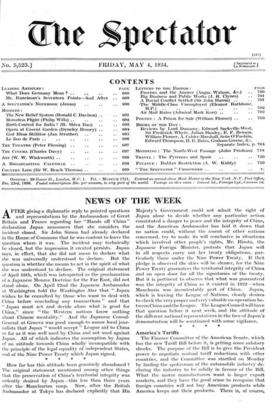America's Tariffs The Finance Committee of the American Senate, which
has the new Tariff Bill before it, is getting some salutary shocks. The purpose of the 1ill is to give the President power to negotiate mutual tariff reductions with other countries, and the Committee was startled on Monday by finding the spokesman of the automobile industry de- claring the industry to be solidly in favour of the Bill. What the motor manufacturers want is larger export markets, and they have the good sense to recognize that foreign- countries will not buy American-products while America keeps out their products. There is, of course, another side to the questionv and it was put by the lead pencil manufacturers, who produced Japanese pencils costing twenty-two cents (say 11d.) a gross, as proof that what was wanted in that case was not a reduction but an increase of duties. Altogether it seems likely that Presi- dent Roosevelt will get the powers he asks for, though possibly not for as long a period as he would like. If he does get them he will pretty certainly use them in the direction of lowering tariffs on the lines known to be strongly favoured by his Secretary of State, Mr. Cordell Hull, and outlined by Mr. Hull.,when he told the Associated Press some ten days ago that what the United States needed was a programme of international economic co- operation based on a more liberal commercial policy. The adoption of a lower tariff policy by so consistently a high tariff country as the United States would be a notable milestone on the road to world recovery.













































